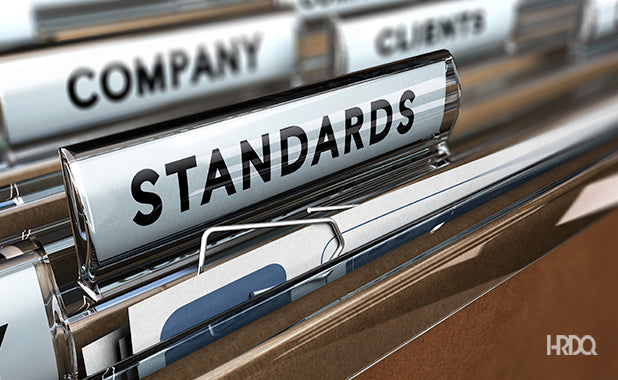Share
Effective Teamwork: The Conditions, Skills, and Components
Bradford R. GlaserCreating an environment where teams can be truly effective and successful requires certain conditions, components, and skills.
Even the most talented and skilled individuals can fail to work together as a team when they aren't supported in the ways that they need to be. At the same time, a group of people with a lot of room for growth can effectively reach goals when given the support and resources they need.
What exactly goes into creating a successful team? Is your team missing any of these essential components?
Let's look at how you can help create the conditions and offer the skills your team needs to achieve their goals and forge forward towards success.

- Identify personal leadership styles
- Capitalize on style strengths
- Minimize style trouble spots
Table of Contents
- The Necessary Conditions for Optimal Teamwork
- Compelling Purpose
- Supportive Structure
- Clearly Defined Roles
- Supportive Context
- Shared Understanding
- Collaborative Environment
- Empathetic Culture
- Clear Standards
- Recognition and Feedback
- The Components of Teamwork
- Open Communication
- Concrete Goals
- Empowerment and Autonomy
- Culture of Innovation and Vision
- Allowing Risk Taking
- Trust
- Essential Skills for Effective Teamwork
- Time Management
- Communication
- Commitment
- Respect
- Flexibility
- Goal Setting
- Decision-Making
- Problem-Solving
- Emotional Intelligence
- Creating Effective Teamwork Through Strong Leadership
The Necessary Conditions for Optimal Teamwork
Even if you have assembled a genuinely remarkable dream team for a project, performance will suffer when certain conditions aren't met. Here are the most essential conditions you will want to create for your team to support their success.
Compelling Purpose
The most effective teams have a direction they are heading in that they, individually and as a group, find compelling. Not only does everyone understand what they're working toward together, but they understand why it's worth the effort in the first place.

This is a crucial precursor to inspiration and motivation – there must be a common goal with a shared desire to achieve this goal.
Supportive Structure
While being driven by a compelling purpose is a great start, teams must also exist within a structure that enables them to succeed. They must be supported by the system they are in, not held back by it.

That means ensuring that the right combination of people with the right skills are working together to reach the goal.
Clearly Defined Roles
When there aren't clearly defined roles and responsibilities within a team, chaos will increasingly grab hold of your project.

On the other hand, if everyone knows what is expected of them, your team can function like a well-oiled machine.
Supportive Context
Your team also needs to be able to perform within a context that is supportive of them. That means offering them the training, education, and necessary access to information.

Beyond that, they need the materials and resources required to accomplish their task, including funding, software, technological tools, and more.
Shared Understanding
Something beautiful can happen when the right group comes together to achieve a specific task or goal. By bringing together people from diverse backgrounds with diverse skills, you can create a situation where the whole really is more than the sum of its parts.

A key element to creating this outcome is when a group of individuals with their own personalities, strengths, and experiences can tap into a shared mindset. Despite their differences, they can build a shared identity as a group and a collective understanding that allows them to function as a complex, effective unit.
Collaborative Environment
In order for teams to be as effective as possible, it's also crucial that individuals exist within a collaborative environment.

Within your team, your department, and your organization, it's essential that the overall climate promotes and encourages collaboration between people and groups. If there is a mindset of "every person for themselves," teams will struggle to truly become cohesive.
Empathetic Culture
Another essential condition required for the most effective teams is an empathetic culture. That means your workplace actively promotes individual and group understanding of each other's experiences.

Rather than having an "us vs. them" culture, the norm is for individuals to strive to gain a deeper understanding of their co-workers and teammates.
Clear Standards
A bit of organization can go a long way when creating incredible teams. If you don't set clear standards of expectation, you'll find that people are all over the map regarding how they complete their work, how they interact with each other, how they behave, and so on.

By clearly outlining what is expected of everyone, you are creating the conditions for a team that can accomplish great feats efficiently.
Recognition and Feedback
Your team isn't a static entity – it's ever-evolving. It's just as important to take the necessary steps to make your team function effectively today as it is to invest in your team's growth and future potential.

By offering feedback and recognition to individuals and the entire team, you're greasing the gears on the elevator of success.
The Components of Teamwork
What are the pieces of the effective teamwork puzzle? What components must be present for teams to work together and perform at their best? Let's look at the vital elements of teamwork to help you improve your team.
Open Communication
You've probably heard that communication is key when it comes to teamwork, but this point genuinely cannot be overstated. Communication is how your team will be able to understand each other and make more effective decisions.

When there is a culture of open communication, it means that there are fewer misunderstandings and less conflict. Even when conflict does arise, it allows for more efficient conflict resolution.
Concrete Goals
Having a compelling purpose is essential for a team to succeed, and sometimes these purposes are more abstract or "big-picture." However, it's also important to have tangible, concrete goals everyone is working toward.

These are goals that can be broken down into smaller tasks and are composed of milestones that can be celebrated.
Empowerment and Autonomy
When managing a team, it's easy to try and control every little action to ensure you are working towards your goals efficiently. However, the truth is that micromanagement can stifle the ability of a team to be as effective as possible.

Instead, take steps to empower your team and increasingly offer them autonomy. Doing so will help boost their morale, improve job satisfaction, and spur creative thinking.
Culture of Innovation and Vision
If you want your team to be their best, you'll want them to exist within a larger culture of idea generation and innovation.

Team members should be excited to offer new ideas and feel comfortable doing so. By encouraging team members to think creatively and develop innovative solutions, you'll find that your brainstorming sessions are far more productive and collaborative.
Allowing Risk Taking
Risk is scary, particularly when you're trusting others to take them. The truth is, though, that little can be gained without taking some risks from time to time.

While the idea isn't to encourage reckless actions and activities, creating a culture of taking calculated risks can work wonders for your team.
Trust
No matter how talented and skilled the individuals that comprise your team are, you will struggle to create the type of teamwork you're looking for without solid trust.
Trust is, perhaps, the most crucial component of teamwork. It should be one of the highest priorities, if not the highest priority, at every stage of your journey together as a group.

There are numerous things you can do to work to build trust within your team, including:
- Encouraging autonomy and avoiding micromanagement
- Clearly defining roles and creating an accountability flowchart
- Openly praising team members for their achievements
- Providing opportunities for team members to develop deeper relationships with one another
Essential Skills for Effective Teamwork
Beyond the conditions and components of teamwork, several crucial skills must be developed at the individual and group levels. Let's look at some of the most essential skills you'll want your team to have to ensure you are working together most effectively.
Time Management
Though the skill of time management might sound pretty simple, it involves more than your team showing up on time for your next meeting or meeting an important deadline.

It has to do with the ability to prioritize tasks and projects, knowing what to work on when, and being able to design realistic timelines for projects.
To help your team members learn how to better balance and organize their time, check out our Time Management customizable course.
Communication
As mentioned earlier, communication is key when it comes to effective teams.

If you want your team to perform at its best, you'll want to invest in their communication skills.
You and your team can use the What's My Communication Style tools and assessment to help you hone this invaluable skill.
Commitment
If all of your team members aren't fully committed to the task or project at hand, performance will undoubtedly suffer.

Everyone must be willing to pull their weight and feel motivated to help the team achieve its goals.
Respect
Mutual respect is another essential skill that must be developed for your team to perform at its best. This entails ensuring that every individual can be empathetic towards their team members and understand that everyone is entitled to their own opinions. Beyond that, it has to do with being dedicated to finding effective points of compromise throughout the time the team works together.

When teams are prone to being hyper-critical, competitive, or gossipy, it will put a damper on both productivity and morale. Beyond that, team members will inevitably start looking for work opportunities elsewhere when they feel they aren't receiving the respect they deserve.
Flexibility
As they say, change is the only constant in life. The same is true about business, and teams must work to increase their flexibility and adaptability to changing conditions.

Whether this means incorporating new software into their workflow, dealing with changing personnel, or shifting gears from one goal to another, helping your team learn to roll with the punches can work wonders for team cohesiveness overall.
Goal Setting
We've already discussed how important it is for teams to have a shared purpose and concrete goals they are working toward. However, neither of these are possible without being skilled in goal setting.

That involves defining the team's specific objectives, designing a plan to achieve these goals, and tracking progress as the team works towards the desired end. Beyond the ability to clearly define objectives, goal setting involves the ability to prioritize goals, the focus and determination to stick with a plan once it is made, and maintaining the flexibility to change course if necessary.
Decision-Making
While some decisions will be made higher up that are passed down to teams, effective teamwork involves making many smaller decisions.

Decision-making as a skill involves the ability to think clearly and critically, identify problems, define objectives, come up with alternative paths, weigh pros and cons, analyze data, and much more.
Problem-Solving
Your team will inevitably encounter problems and challenges while working toward their goal.

Their ability to come up with creative and practical solutions will have a significant impact on their efficiency and performance as a team.
Emotional Intelligence
The better your team members can manage their own emotions and interact with the emotions of others, the more effective your team will be.

When a team collectively possesses strong emotional intelligence skills, they are more communicative, cohesive, and adaptable.
Is it time for your team to brush up on their emotional intelligence skills? Make sure you check out our Emotional Intelligence customizable course.
Creating Effective Teamwork Through Strong Leadership
While many elements go into creating the most effective teams, one of the most essential aspects is strong leadership. Even the most capable and skilled individuals can struggle to work together successfully when a leader can't direct and motivate them. A leader must create a clear vision that their team can believe in, help them understand the path they need to walk to get there and provide the necessary support and guidance to help ensure their success.

Are you interested in improving your leadership skills or the leadership skills of your management team? If so, you'll want to check out our What's My Leadership Style course, which helps individuals pinpoint their leadership style and learn how to adapt their style to different situations.
Do you have any questions about effective teamwork or how you can go about creating an effective team in your workplace? If so, please feel free to let us know in the comments section down below, and we'll get back to you within a day or two! We do our best to ensure that every comment receives a reply in a timely manner, and we'd be more than happy to assist you however we can.

- Identify personal leadership styles
- Capitalize on style strengths
- Minimize style trouble spots





















































